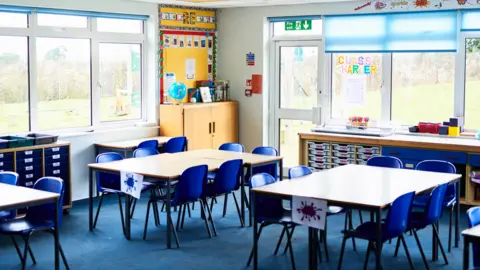School: One in six secondary pupils regularly absent in Wales
 Getty Images
Getty ImagesAbout one in six secondary school pupils in Wales are persistently absent from school, new figures have shown.
Welsh government data suggests 16.3% of pupils aged 11-15 fell into this category in 2022-23, three times higher than pre-pandemic levels.
For pupils eligible for free school meals, this figure was more than twice as high at 35.7%.
Education Minister Jeremy Miles said a "task force" would "look in depth" into the reasons behind non-attendance.
Persistent absence is defined as missing 20% of the most common required sessions.
Overall levels of absence, based on missed half-day sessions, have also doubled.
Pupils in Year 11 showed the biggest increase in absenteeism - those pupils were in their first year of secondary school when schools were closed as part of the first UK-wide lockdown.
There is only a small difference between boys and girls - in 2022-23 girls missed an average of 13% of half-day sessions and boys missed an average of 12%.
It is the first time this data has been published since 2019, as collection was suspended in March 2020.
Data collection for primary schools was also suspended during the pandemic and will next be published in the spring.
 ASCL
ASCLAssociation of School and College Leaders Cymru, Eithne Hughes, dubbed the statistics "shocking" and "staggering".
But she said she did not think many in the profession would be surprised.
"The pandemic came as a major event, clearly, and the statistics immediately became a real issue of focus," Ms Hughes told BBC Radio Wales Drive.
"We cannot avoid the fact this has been a real catalyst in moving toward a position where we have got a lot of persistent absence as a result of children getting out of the habit of attending."
She also said children were struggling to get into the rhythm of school life.
"It is a desperate picture we are looking at, but we really need to look at doing things together with government, outreach support workers, social services," Ms Hughes added.
"But we cannot do any of this without funding. Schools cannot do this on their own."
Welsh Conservative education spokeswoman Laura Anne Jones urged Welsh ministers to come up with a detailed plan to address the rising school absences.
"Students with high absence rates are at a significant disadvantage by missing out on key learning opportunities and poor attendance can lead to gaps in pupils' knowledge," she said.
"With the attainment gap growing between Wales and the rest of the UK, Labour must answer for their increasing failures on education in Wales."
Heledd Fychan, who speaks for Plaid Cymru on education, called the figures "immensely worrying".
"There are already so many barriers to attending school - including the cost of transport and social exclusion experienced by low income learners," she said.
"Welsh government must detail how they intend to address the underlying causes of school absenteeism."
What is the minister's position?
Mr Miles said he would establish a National Attendance Taskforce and new "engagement and attendance guidance" will be published in the coming weeks.
In a written statement, he said: "There are often complex and multiple factors lying behind non-attendance.
"These could include mental health and wellbeing, availability of specific learning support services, and the ever-rising cost of living and attitudes of parents and learners towards school attendance generally.
"As such a priority of the group will be to look in depth into the reasons behind non-attendance and bring to bear their expertise to identify actions that can bring about sustained improvements."
